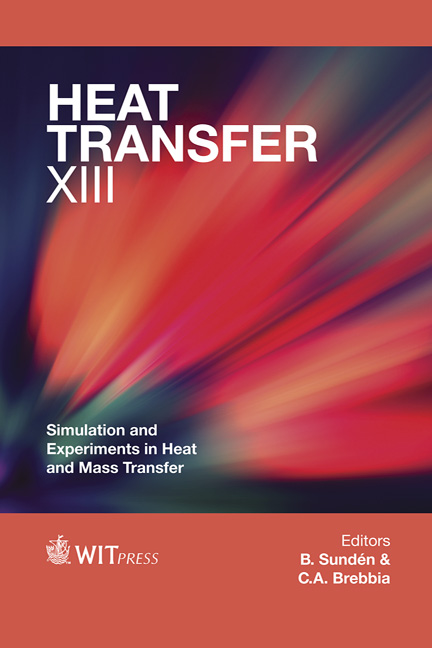Entropy Generation Analysis Of Engineered Heat Transfer Fluids Under A Constant Surface Temperature
Price
Free (open access)
Transaction
Volume
83
Pages
11
Page Range
39 - 49
Published
2014
Size
531 kb
Paper DOI
10.2495/HT140041
Copyright
WIT Press
Author(s)
G. Soriano, G. Bravo, P. Guevara & F. Porras
Abstract
An assessment of the use of engineered heat transfer fluids working under constant wall temperature conditions in the turbulent regime is presented. An analysis of entropy generation and pumping power on the system working with different engineered heat transfer fluids is performed. Three types of fluids are considered: multiwalled carbon nanotube (MWCNT) based nanofluids, slurries with microencapsulated phase change materials (MPCM) and a mixture of both fluids. Specific heat, thermal conductivity and viscosity of the fluids are included in the analysis using theoretical and experimental results available in literature. Nanofluids in the system result on greater entropy generation and pumping power consumption when compared with base fluid. MPCMs slurries produce the minimum entropy generation and pumping power consumption. Mixtures are affected by the content of nanofluids resulting in a performance below of MPCMs slurries. The improvement on the heat capacity of the fluid produced by the Microencapsulated phase change material is the main factor in reducing entropy generation and pumping power consumption for the system. Under the conditions assessed, the increase in viscosity offsets the increase in thermal conductivity on the MWCNT based nanofluids. On the other hand in the case of MPCM slurries, the increase in heat capacity outweighs the reduction in thermal conductivity and increase in viscosity. Keywords: entropy, engineered fluids, MWCNT nanofluids, MPCM slurries.
Keywords
entropy, engineered fluids, MWCNT nanofluids, MPCM slurries.





